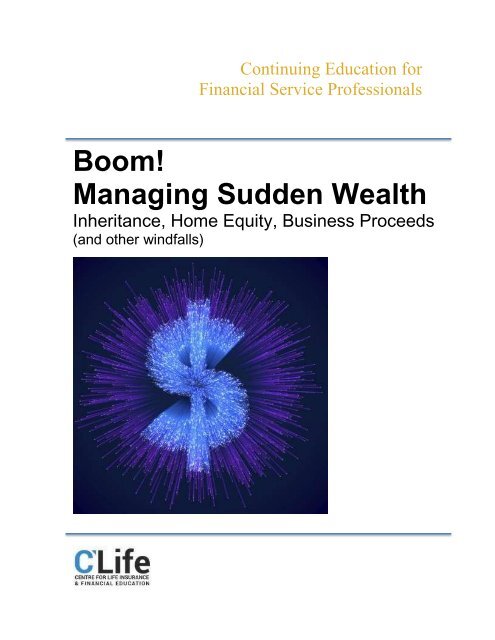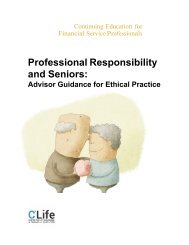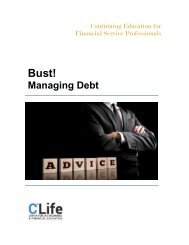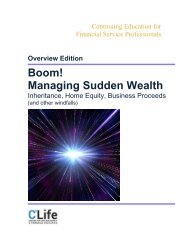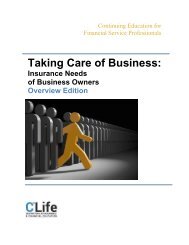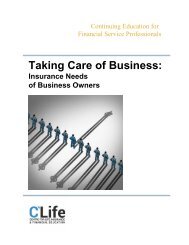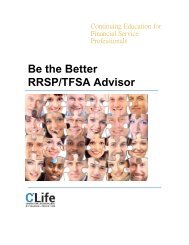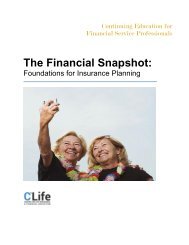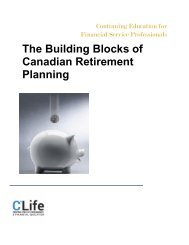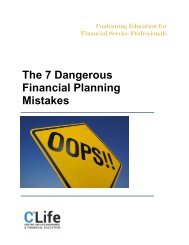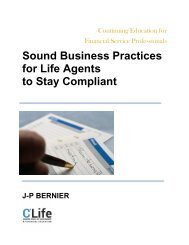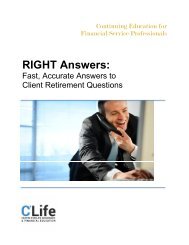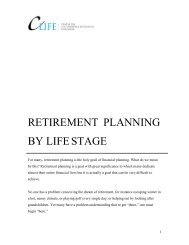Boom! Managing Sudden Wealth - Full Course
In 2015, Canadian life insurers paid out approximately $160 million per week in death benefits. This is just one part of the immense transfer of wealth from one generation to the next that is happening now. Get on board with the knowledge you need to find and manage sudden wealth, such as that received from insurance proceeds, property inheritance, real estate proceeds, or the sale of a business. Learn how to manage client expectations and risks. Deal with issues like debt, investing, and insurance. Provide solutions. This is a must-do course if you plan to work with this growing market.
In 2015, Canadian life insurers paid out approximately $160 million per week in death benefits. This is just one part of the immense transfer of wealth from one generation to the next that is happening now.
Get on board with the knowledge you need to find and manage sudden wealth, such as that received from insurance proceeds, property inheritance, real estate proceeds, or the sale of a business.
Learn how to manage client expectations and risks. Deal with issues like debt, investing, and insurance. Provide solutions. This is a must-do course if you plan to work with this growing market.
You also want an ePaper? Increase the reach of your titles
YUMPU automatically turns print PDFs into web optimized ePapers that Google loves.
Continuing Education for<br />
Financial Service Professionals<br />
<strong>Boom</strong>!<br />
<strong>Managing</strong> <strong>Sudden</strong> <strong>Wealth</strong><br />
Inheritance, Home Equity, Business Proceeds<br />
(and other windfalls)
<strong>Boom</strong>! <strong>Managing</strong> <strong>Sudden</strong> <strong>Wealth</strong>: Inheritance, Home Equity, Business Proceeds<br />
(and other windfalls)<br />
Copyright © 2016 CLIFE Inc.<br />
All rights reserved. Any reproduction of parts or all of this course and its contents by<br />
any means electronic or mechanical is prohibited.<br />
<br />
<br />
The information in this book is provided for educational purposes only; it should<br />
not be construed or interpreted as providing advice. Agents and advisors should<br />
always seek guidance from their principals and compliance experts in regards to<br />
informing themselves and others about details of the products they sell and other<br />
considerations of their business.<br />
<br />
<br />
We welcome all feedback and suggestions for additions to the book. Please send<br />
your comments to info@clifece.ca.<br />
CLIFE INC.<br />
6 – 14845 Yonge Street<br />
Suite 139<br />
Aurora, ON<br />
L4G 6H8<br />
www.clifece.ca<br />
<strong>Boom</strong>! <strong>Managing</strong> <strong>Sudden</strong> <strong>Wealth</strong> provides continuing education credits upon satisfactory completion of an<br />
online test. Please see the website for details or email info@clifece.ca.<br />
2
Table of Contents<br />
1. Hello Money! 4<br />
2. <strong>Sudden</strong> <strong>Wealth</strong> Sources 7<br />
3. What’s Mine; What’s Ours 13<br />
4. Constraints to Consider 15<br />
5. The Decision-free Zone 19<br />
6. The Proverbial Elephant in the Room 23<br />
7. What To Do First 28<br />
8. Will Power 53<br />
9. Ditch the Debt 75<br />
10. How Much is Enough? 76<br />
11. Give It Away 82<br />
12. Save It 93<br />
13. Invest It 121<br />
14. Insurance Needs, Revisited 136<br />
15. Threats to <strong>Wealth</strong> 147<br />
16. A Taxing Concern 152<br />
17. Taking Care 160<br />
18. What To Do Next 163<br />
3
1. Hello Money!<br />
It is easy to see how receiving a<br />
windfall or receiving a large sum can<br />
be a blessing: the money can solve<br />
problems and fulfill dreams.<br />
Can it also be perceived as a burden?<br />
<br />
People can become paralyzed by<br />
decisions about what to do with the<br />
money. Invest? Spend? Save?<br />
Give it away? What’s best?<br />
<br />
It can become divisive for a couple who can’t agree on a plan of action together,<br />
and individuals and couples may find themselves being pressured by family<br />
members or friends into taking action that they don’t necessarily agree with.<br />
<br />
This situation is best typified by hapless lottery winners who find themselves<br />
broke after their big win. Statistics show that lottery winners file for bankruptcy at<br />
double the rate of the general population (Forbes, The Windfall Effect: What to<br />
Do with Surprise Cash, online) When it’s gone, many have no answer to the<br />
question of: where did the money go?<br />
<br />
It’s like Steve Martin says, “I love money. I love everything about it. I bought<br />
some pretty good stuff. Got me a $300 pair of socks. Got a fur sink. An electric<br />
dog polisher. A gasoline-powered turtleneck sweater. And, of course, I bought<br />
some dumb stuff, too.”<br />
4
Steve Martin was suffering from a clear case of affluenza: a condition<br />
experienced by people who lose respect for money and the good uses to which it<br />
can be put.<br />
<br />
There are many psychological factors that drive the newly wealthy. One theory<br />
states that “money earned without making effort has little value.” This type of<br />
thinking may be the reason some people spend through the sum they receive<br />
and fail to properly manage their windfall.<br />
<br />
For heirs, the emotions that come with sudden wealth can be a mix of guilt, loss,<br />
anger, regret, relief and hurt, perhaps stewed with long-simmering family rivalries<br />
and resentments.<br />
<br />
Adjustment problems experienced by people with newfound wealth may be<br />
described as “<strong>Sudden</strong> <strong>Wealth</strong> Syndrome.” They:<br />
o feel a sense of isolation from former friends;<br />
o feel guilty about their good fortune;<br />
• Guilt is particularly experienced when the money is received in an<br />
insurance settlement paid after the death of a loved one.<br />
o fear losing the money they have gained.<br />
<br />
There tend to be four reactions among those who become suddenly rich:<br />
o They want to fight with family and advisers over the money;<br />
o They want to flee the situation and not deal with their newfound wealth;<br />
o They freeze by analyzing all the possibilities that the money brings;<br />
o They appease all requests from others about how they should spend it.<br />
<br />
Becoming suddenly rich causes people with new money to behave<br />
inconsistently, overreact, or focus on narrow concerns. Why? Their lives are<br />
changed, and for the most part, people do not like change, especially when they<br />
feel they lose control, and just do not know what to expect or what is going to<br />
happen.<br />
5
You are the financial expert who creates that sense of control, and restores a sense of<br />
equilibrium.<br />
<br />
You can create a plan, instill discipline on spendthrifts, and develop a financial future for<br />
those who enjoy such fortune as a result of real estate equity, inheritance, or other<br />
means. It is a plan that influences subsequent practice.<br />
<br />
You may have some heavy lifting to do in the early part of your relationship. You will need<br />
to instill knowledge and discipline in your client. You may play the role of educator, coach,<br />
and counsellor.<br />
<br />
This is your “Big Opportunity.” You have a lot to work with, and with great rewards come<br />
great responsibilities. The point is: when an individual or couple receives a lot of money,<br />
you have opportunities to shine in the short-term and the years to come. Let’s find out how.<br />
CLICK HERE TO ORDER<br />
6


